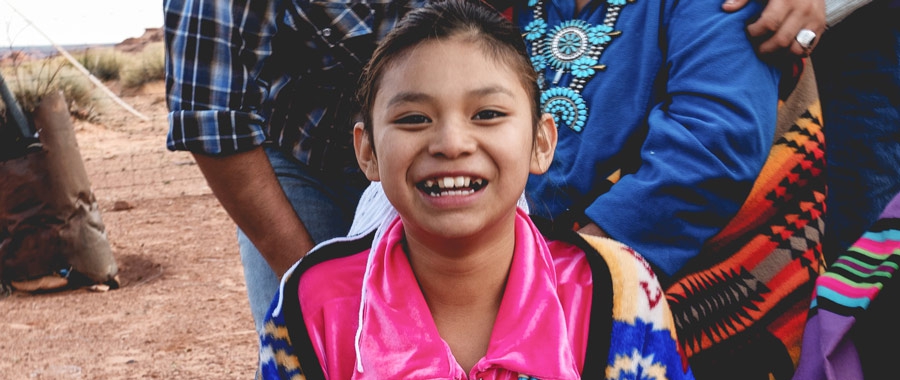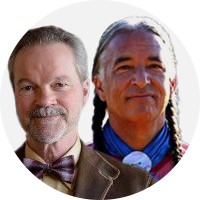The views expressed in our content reflect individual perspectives and do not represent the authoritative views of the Baha'i Faith.
The United Nations officially designated 2019 as the UN International Year of Indigenous Languages – so what does that mean from a Baha’i perspective?
In this ongoing conversation about Indigenous messengers of God between Chris Buck and Kevin Locke, BahaiTeachings.org examines the profusion of different languages among Indigenous cultures and the misunderstandings that diversity has traditionally led to, as well as the clear and present danger of the loss of those linguistic traditions among so many Indigenous peoples. We also explore the solution – the Baha’i principle of a universal auxiliary language, a key part of the Baha’i goal of universal peace:
Baha’u’llah has proclaimed the adoption of a universal language. A language shall be agreed upon by which unity will be established in the world. Each person will require training in two languages: his native tongue and the universal auxiliary form of speech. This will facilitate intercommunication and dispel the misunderstandings which the barriers of language have occasioned in the world. All people worship the same God and are alike His servants. When they are able to communicate freely, they will associate in friendship and concord, entertain the greatest love and fellowship for each other, and in reality the Orient and Occident will embrace in unity and agreement. – Abdu’l-Baha, The Promulgation of Universal Peace, p. 300.
Q: Kevin, I just watched a video of Emma Stevens performing the Beatles song “Blackbird” – sung in her native tongue Mi’kmaq, the language of her indigenous Eastern Algonquian tribal people.
What a pure, authentic, and soulful voice! I don’t understand a word of the Mi’kmaq language, but I immediately understood the spirit in which she sang this version of “Blackbird.” It was beautiful, moving, entrancing.
The Baha’i teachings, as you well know, advocate the adoption of a universal auxiliary language, taught alongside the mother tongues of all peoples – a call for universal bilingualism as a tool for global communication, but also a way to preserve each group’s original language:
Diversity of languages has been a fruitful cause of discord. The function of language is to convey the thought and purpose of one to another. Therefore, it matters not what language man speaks or employs. … Baha’u’llah advocated one language as the greatest means of unity and the basis of international conference. He wrote to the kings and rulers of the various nations, recommending that one language should be sanctioned and adopted by all governments. According to this each nation should acquire the universal language in addition to its native tongue. The world would then be in close communication, consultation would become general, and dissensions due to diversity of speech would be removed. – Ibid., pp. 232–233.
So given this primary Baha’i principle, how important is preserving the mother tongues of indigenous languages, such as Mi’kmaq and Lakota, for example? Also, didn’t your mother, the late Patricia Locke, dedicate much of her time and energy to preserving Lakota indigenous language and culture, while promoting the Baha’i Faith as well?
A: Yes, Chris, my mother was dedicated to the highly important task of language revitalization. Her mother grew up speaking Lakota and her father spoke only Ojibwe in his younger years. Consequently my mother and her sister were raised with English as the common household language, and only heard Indigenous languages when their parents’ relatives visited. Of course, their classmates in school were non-English-speaking. But since their father was transferred from one BIA [Bureau of Indian Affairs] post to another every three or four years – and the suppression of Indigenous languages was horrendous at each school and post – they were not able to achieve fluency in any of the languages they heard. Since my mother witnessed first-hand the trauma of forced language/culture eradication, she applied herself full force to healing these deep wounds.
In recent years, abundant research has revealed the merits of bilingualism/multiculturalism and vindicated my mom’s dedication.
Q: Many preservation efforts now exist to defend, protect and save endangered Indigenous languages around the world. We know that language underpins every society, and when Indigenous languages die out, part of the culture dies with them. The United Nations Educational, Scientific and Cultural Organization (UNESCO) estimates that the world now speaks about 7,000 languages – but that half of the world’s population speak only the eight most common ones. They also report that approximately 3,000 of the world’s languages are spoken by less than 10,000 people each, which makes them endangered, especially if those languages aren’t taught to the younger generations. What, in your view, can be done to save the hundreds of endangered Indigenous languages and the cultures they represent?
A: Only two things, as far as I know, can truly save those endangered tongues – first, the ongoing efforts by various tribes and peoples to ensure the continuation of their linguistic traditions, and second, the adoption of a universal auxiliary language, as the Baha’i teachings recommend. When that happens, every culture could continue speaking their native tongue, but still communicate with the wider world in one accepted universal language. Otherwise, the world’s dominant languages, and the cultural hegemony that often comes along with them, will soon make many languages unheard, unpracticed and untaught.
















Comments
Sign in or create an account
Continue with Googleor